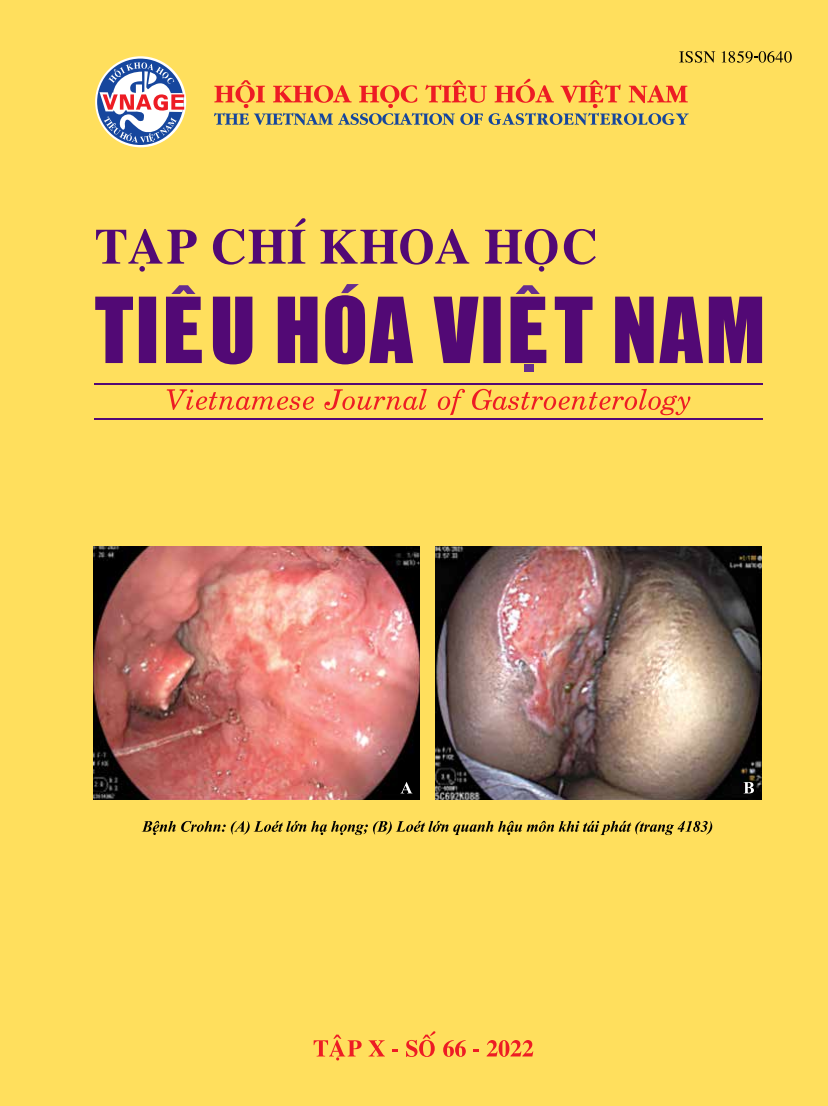Cập nhật điều trị IBS và vai trò của các thuốc chóng co thắt
Tóm tắt
Hội chứng ruột kích thích là một rối loạn chức năng ruột main tính bao gồm đau bụng và rối loạn tiêu hóa (tiêu chảy và/hoặc táo bón). Bệnh khá thường gặp, với tỷ lệ hiện mắc trên thế giới dao động từ 10 - 20%, ảnh hưởng rất nhiều đến chất lượng sống người bệnh đồng thời tăng chi phí chăm sóc y tế. Nhiều yếu tố liên quan có cheá bệnh sinh của IBS, nhưng rối loạn trung tâm của hội chứng này được đa số chuyên gia đồng thuận hiện nay chính là rối loạn chức năng trục não ruột. Các biện pháp điều trị tập trung cải thiện triệu chứng nhằm nâng cao chất lượng sống. Đau bụng tái đi tái lại là triệu chứng bắt buộc của IBS. Cơ chế đau bụng chủ yếu do rối loạn co thắt và tăng nhạy cảm thụ thể. Vì vậy, thuốc chống co thắt là lựa chọn hàng đầu trong kiểm soát đau bụng và vài triệu chứng kèm của IBS. Thuốc chống trầm cảm và các thuốc điều hòa thần kinh khác là lựa chọn thứ hai khi điều trị giảm co thắt có hiệu quả kém. Ngoài ra, tuỳ theo triệu chứng nội trội kèm theo của từng bệnh nhân, thầy thuốc sẽ chỉ định thêm các thuốc chống tiêu chảy hoặc táo bón. Hiện có thêm nhiều nhóm thuốc mới được phát triển để điều trị các triệu chứng này. Tư vấn bệnh nhân, thiết lập mối quan hệ bệnh nhân - thầy thuốc và điều trị cá nhân hoá có vai trò quan trọng hàng đầu mang lại hiệu quả tích cực trong điều trị IBS.
Tài liệu tham khảo
1. Aziz, I., Simreùn, M. (2021). The overlap between
irritable bowel syndrome and organic gastrointestinal
diseases.The Lancet. Gastroenterology and
hepatology,6(2), 139–148.
2. Azpiroz, F., Bouin, M., Camilleri, M., Mayer, E.
A., Poitras, P., Serra, J., and Spiller, R. C. (2007).
Mechanisms of hypersensitivity in IBS and functional
disorders.Neurogastroenterology and motility: the
official journal of the European Gastrointestinal
Motility Society,19(1 Suppl), 62–88.
3. Canavan, C., West, J., and Card, T. (2014). The
epidemiology of irritable bowel syndrome.Clinical
epidemiology,6, 71–80.
4. Chey, W. D., Lembo, A. J., and Rosenbaum,
D. P. (2020). Efficacy of Tenapanor in Treating
Patients with Irritable Bowel Syndrome with
Constipation: A 12-Week, Placebo-Controlled
Phase 3 Trial (T3MPO-1).The American journal of
gastroenterology,115(2), 281–293.
5. Ford, A. C., Sperber, A. D., Corsetti, M., et
Camilleri, M. (2020). Irritable bowel syndrome.
Lancet (London, England),396(10263), 1675–1688.
6. Grad, S., and Dumitrascu, D. L. (2020). Irritable
Bowel Syndrome Subtypes: New Names for Old
Medical Conditions.Digestive diseases (Basel,
Switzerland),38(2), 122–127.
7. Jiang, C., Xu, Q., Wen, X., and Sun, H. (2015). Current
developments in pharmacological therapeutics for
chronic constipation.Acta pharmaceutica Sinica.
B,5(4), 300–309.
8. Lacy, B. E., Pimentel, M., Brenner, D. M., Chey,
W. D., Keefer, L. A., Long, M. D., and Moshiree,
B. (2021). ACG Clinical Guideline: Management of
Irritable Bowel Syndrome.The American journal of
gastroenterology,116(1), 17–44.
9. Lembo, A., Pimentel, M., Rao, S. S., Schoenfeld, P.,
Cash, B., Weinstock, L. B., Paterson, C., Bortey, E.,
and Forbes, W. P. (2016). Repeat Treatment with
Rifaximin Is Safe and Effective in Patients with
Diarrhea-Predominant Irritable Bowel Syndrome.
Gastroenterology,151(6), 1113–1121.
10. Miller, V., Hopkins, L., and Whorwell, P. J.
(2004). Suicidal ideation in patients with irritable
bowel syndrome.Clinical gastroenterology
and hepatology: the official clinical practice
journal of the American Gastroenterological
Association,2(12), 1064–1068.
11. Miner P. B., Jr (2018). Efficacy and safety of
plecanatide in treating constipation predominant
irritable bowel syndrome.Expert opinion on
pharmacotherapy,19(2), 177–183.
12. Pimentel, M., Lembo, A., Chey, W. D., Zakko,
S., Ringel, Y., Yu, J., Mareya, S. M., Shaw, A.
L., Bortey, E., Forbes, W. P., and TARGET Study
Group (2011). Rifaximin therapy for patients with
irritable bowel syndrome without constipation.The
New England journal of medicine,364(1), 22–32.
13. Poynard, T., Naveau, S., Mory, B., vaø Chaput, J. C.
(1994). Meta-analysis of smooth muscle relaxants
in the treatment of irritable bowel syndrome.
Alimentary pharmacology vaø therapeutics,8(5),
499–510.
14. Poynard, T., Regimbeau, C., and Benhamou, Y.
(2001). Meta-analysis of smooth muscle relaxants
in the treatment of irritable bowel syndrome.
Alimentary pharmacology vaø therapeutics,15(3),
355–361.
15. Quigley, E. M., Fried, M., Gwee, K. A., Khalif, I.,
Hungin, A. P., Lindberg, G., Abbas, Z., Fernandez, L.
B., Bhatia, S. J., Schmulson, M., Olano, C., LeMair,
A., & Review Team: (2016). World Gastroenterology
Organisation Global Guidelines Irritable Bowel
Syndrome: A Global Perspective Update September
2015.Journal of clinical gastroenterology,50(9),
704–713.
16. Stanghellini, V., Chan, F. K., Hasler, W. L.,
Malagelada, J. R., Suzuki, H., Tack, J., and
Talley, N. J. (2016). Gastroduodenal Disorders.
Gastroenterology,150(6), 1380–1392.









